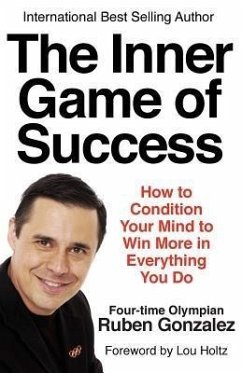
The Salesman: A Biography of Paul J. Meyer (eBook, ePUB)

PAYBACK Punkte
0 °P sammeln!
Along the river of American enterprise, leaders are born and die and their businesses rise and fade away. Paul J. Meyer's enterprise is of more than passing interest because fifty years later, it's easy to see that the company Meyer started created an industry … something that happens only once or twice in a generation.Success Motivation Institute, which Meyer started in January, 1960, was the world's first self-improvement company. SMI was the first to condense and record the handful of self-help books available at the time. The personal development industry we take for granted today d...
Along the river of American enterprise, leaders are born and die and their businesses rise and fade away. Paul J. Meyer's enterprise is of more than passing interest because fifty years later, it's easy to see that the company Meyer started created an industry … something that happens only once or twice in a generation.
Success Motivation Institute, which Meyer started in January, 1960, was the world's first self-improvement company. SMI was the first to condense and record the handful of self-help books available at the time. The personal development industry we take for granted today did not exist in 1960; Meyer and his legion of imitators literally created an industry from the ground up.
Meyer, who died in late October, 2009, became known worldwide for the goal-setting and time management programs he authored. Meanwhile, his company became known for the sheer number of failed distributors across the United States. These were people who bought into Meyer's dream (with investments ranging up to $30,000) and then found the going too rough. They probably number in the tens of thousands. During the years when Meyer's success philosophy spread to virtually every corner of the globe, almost every American town had at least one failed SMI business. Most cities had several; in larger metropolitan areas, there were literally dozens of failed success merchants.
In The Salesman, bestselling author Jim Moore separates Meyer from the excesses of his empire - and shows how the two were also inexorably linked. Moore knows whereof he writes; he was Meyer's corporate archivist for a decade, one of the few standout SMI franchisees, an SMI home office executive, and Meyer's close friend.
If enterprise is a river, the success industry Meyer started has become a raging torrent. Most of today's standout motivators - people like Tony Robbins, Brian Tracy and John Maxwell - owe Meyer a tremendous debt. As bestselling management author Ken Blanchard noted, "Paul paved the way for all of us."
Meyer combined his success philosophy with a well-crafted marketing appeal that endeared him to hundreds of thousands around the world. During his lifetime, Meyer carefully controlled what was written and printed about him; he owned one of the largest printing operations in the United States and ran the presses with abandon. This book pulls away Meyer's carefully-created veneer, allowing us to see the raw essence of a quintessential American entrepreneur and innovator.
Success Motivation Institute, which Meyer started in January, 1960, was the world's first self-improvement company. SMI was the first to condense and record the handful of self-help books available at the time. The personal development industry we take for granted today did not exist in 1960; Meyer and his legion of imitators literally created an industry from the ground up.
Meyer, who died in late October, 2009, became known worldwide for the goal-setting and time management programs he authored. Meanwhile, his company became known for the sheer number of failed distributors across the United States. These were people who bought into Meyer's dream (with investments ranging up to $30,000) and then found the going too rough. They probably number in the tens of thousands. During the years when Meyer's success philosophy spread to virtually every corner of the globe, almost every American town had at least one failed SMI business. Most cities had several; in larger metropolitan areas, there were literally dozens of failed success merchants.
In The Salesman, bestselling author Jim Moore separates Meyer from the excesses of his empire - and shows how the two were also inexorably linked. Moore knows whereof he writes; he was Meyer's corporate archivist for a decade, one of the few standout SMI franchisees, an SMI home office executive, and Meyer's close friend.
If enterprise is a river, the success industry Meyer started has become a raging torrent. Most of today's standout motivators - people like Tony Robbins, Brian Tracy and John Maxwell - owe Meyer a tremendous debt. As bestselling management author Ken Blanchard noted, "Paul paved the way for all of us."
Meyer combined his success philosophy with a well-crafted marketing appeal that endeared him to hundreds of thousands around the world. During his lifetime, Meyer carefully controlled what was written and printed about him; he owned one of the largest printing operations in the United States and ran the presses with abandon. This book pulls away Meyer's carefully-created veneer, allowing us to see the raw essence of a quintessential American entrepreneur and innovator.
Dieser Download kann aus rechtlichen Gründen nur mit Rechnungsadresse in A, B, CY, CZ, D, DK, EW, E, FIN, F, GR, H, IRL, I, LT, L, LR, M, NL, PL, P, R, S, SLO, SK ausgeliefert werden.













